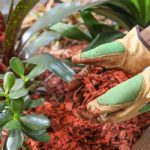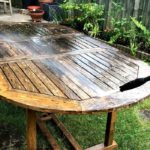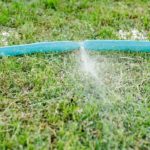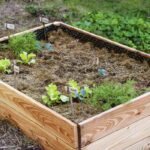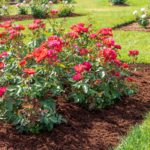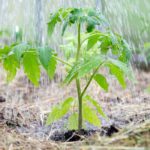Mulch is a layer of material placed on the soil’s surface to improve the aesthetics of a garden, suppress weeds, conserve moisture, and insulate against extreme temperatures. Mulch can be made from various materials, including bark, leaves, straw, and compost. So, which one is best for weed prevention?
The best mulch for weed prevention is organic and made from bark, leaves, or straw. These materials break down over time and improve the quality of the soil. The much should be at least 2-3 inches deep to keep sunlight from reaching the soil and germinating weed seeds.
If you use the right technique, mulching will quickly become an essential and much appreciated part of your gardening routine. Let’s look at how best to use mulch to prevent weeds.
Organic vs. Inorganic Mulch

There are two main types of mulch: organic and inorganic. Organic mulch is made from biodegradable materials, such as wood chips, bark, leaves, and straw. Organic mulch is the best type of mulch to prevent weeds because it breaks down over time and enriches the soil with nutrients.
Inorganic mulch is made from non-biodegradable materials, such as gravel, stones, and rubber. Inorganic mulch doesn’t break down and can harm the soil by preventing air and water from reaching plant roots.
You can always collect your own organic mulch from your yard or garden, purchase it from a gardening store, or order it online.
Can All Mulch Prevent Weeds?
Mulch suppresses weeds by depriving them of sunlight. Weed seeds need sunlight to germinate. If you prevent sunlight from reaching the soil, you prevent weeds from growing. Organic mulch also improves the quality of the soil as it breaks down over time. This process is called composting.
As organic matter decomposes, it releases essential nutrients for plant growth. The added nutrients help plants compete with weeds for resources. Inorganic mulch, such as landscape fabric or black plastic, can also be effective at preventing weeds if used correctly.
Landscape fabric (on Amazon) is a woven fabric that allows water and air to pass through while blocking sunlight. Black plastic (also on Amazon) is a sheet of non-porous material that prevents light from reaching the soil.
Be sure to lay landscape fabric or black plastic beneath mulch to prevent weeds from growing up through the mulch. Mulch is an effective tool for controlling weeds, but it’s not a silver bullet. You will still need to pull existing weeds and be vigilant about new weed growth.
Best Mulch to Prevent Weeds
Organic mulch is the best way to prevent weeds. A thick layer of organic mulch will prevent most weed seeds from germinating and growing. Organic mulch is also free and easy to find. You can use leaves, straw, wood chips, or even grass clippings as mulch.
Avoid using herbicide-treated grass clippings as mulch because the chemicals may harm your plants, and the herbicide may remain in the soil for the entire season.
If you choose to use straw, look for bales without seeds because wheat germinates quickly and can become a weed problem. To achieve the desired weed-preventing thickness, spread a layer of organic mulch at least three inches deep.
Be sure to replenish the mulch every few months to maintain the thickness. Inorganic mulches, such as black plastic or landscape fabrics, may also be used to prevent weeds.
However, these materials must be applied very carefully to avoid harming your plants. Make sure the material you choose is permeable to air and water so that your plants’ roots can breathe and receive moisture.
How to Apply Mulch to Prevent Weeds

Applying mulch is easy and only requires a few simple steps. Begin by clearing the area where you’ll be applying the mulch. Remove all weeds, rocks, and debris to have a clean surface to work with. Next, spread a layer of organic mulch three to four inches deep.
You should avoid piling the mulch too deep around the base of your plants because this can cause them to rot. Once you’ve applied the desired amount of mulch, use a rake or your hands to tamp it down lightly. You can apply mulch around your plants at any time of year, but spring and fall are the best times.
When to Mulch to Prevent Weeds
Mulching in the spring will help to prevent weeds from germinating and growing. If you mulch after the weeds have already begun to grow, they may still be able to push through the mulch and continue growing.
For this reason, it’s best to mulch before the weeds have a chance to sprout. You can also apply a pre-emergent herbicide before mulching to prevent weed growth. Be sure to follow the instructions on the herbicide label carefully to avoid harming your plants.
Other Ways to Prevent Weeds
In addition to mulching, there are several other ways to prevent weeds from growing in your landscape.
Routine Hand Pulling
Hand pulling is an effective way to remove existing weeds and stop new ones from sprouting. Be sure to pull up the entire weed, root and all, so that it doesn’t regrow. You can also use a hoe or trowel to cut the weed off at ground level.
This won’t kill the weed, but it will prevent it from growing taller and producing seeds. Mowing your lawn regularly will also help prevent weeds because it will keep the grass short and make it difficult for weeds to take root.
Chemical Herbicides
Herbicides are chemicals that kill or inhibit the growth of plants. There are two main types of herbicides: selective and non-selective. Selective herbicides will kill certain types of plants while leaving others unharmed. Non-selective herbicides will kill any type of plant they come into contact with, so they must be used very carefully.
Herbicides can be applied either before or after weeds have begun to grow. Pre-emergent herbicides (on Amazon) are applied before the weeds sprout, to prevent them from growing.
Post-emergent herbicides (on Amazon) are applied after the weeds have begun to grow and will kill them within a few days.
Organic weed preventers are also available and can be effective in preventing weed growth. These products usually contain ingredients like vinegar or essential oils that will kill or inhibit the growth of weeds.
Be sure to read the label carefully to choose a product that is safe for use around your plants. No matter what method you choose, it’s important to be consistent with your weed prevention efforts. Some type of weed control should be performed every year to keep your landscape looking its best.

